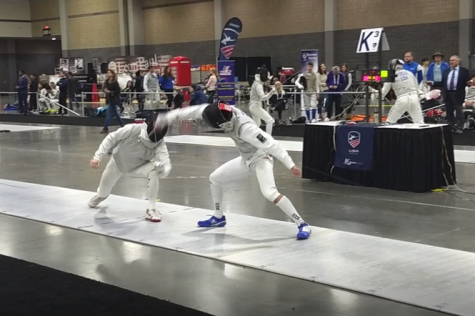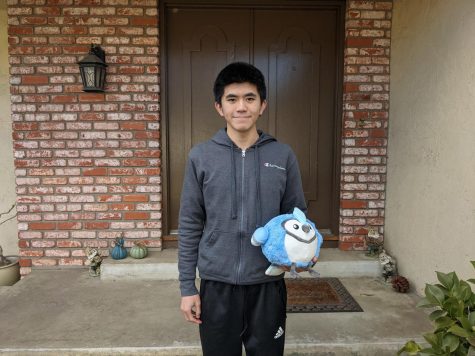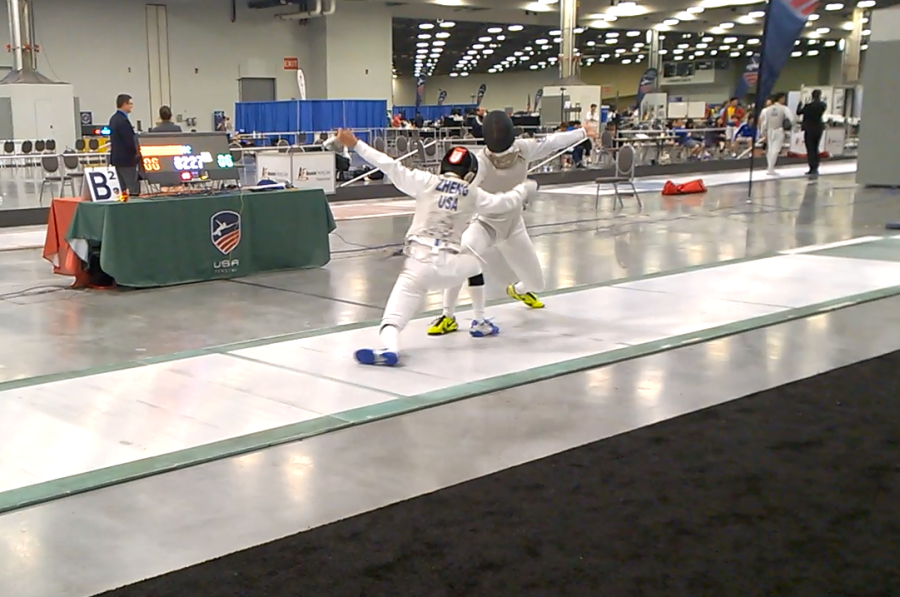Alan Zheng lunges toward his future at Johns Hopkins
Used with permission of Alan Zheng
Zheng competed in the direct elimination cadet event in the 2019 Summer Nationals.
February 3, 2021
After nine years of vigilant training and practice, senior Alan Zheng has committed to Johns Hopkins University (JHU) for Division III fencing and plans to major in computer science.
Zheng became interested in the sport after attending one of his older cousins’ fencing competitions at the age of eight and wanted to try it out for himself. After fencing recreationally for two years, Zheng began competing when he was 10 and truly started to enjoy the sport.
“One of the things I love the most about fencing is its flexibility — not physically, but more in terms of who can participate,” Zheng said. “Short, tall, right-handed, left-handed — there’s always a way to fence, and everyone has their own unique style.”
Zheng fences foil, one of three fencing events, which he initially chose because his cousin competed in the same event. He stuck with foil because he thought that it was the most expressive weapon when it came to individual style and technique. The three fencing events — foil, épée and sabre — all have different types of weapons, fencing styles and target areas. The foil sword is the lightest of the three weapons and has the smallest target area, while épée has a sturdier sword and has a slower pace since the target area is increased to the whole body. The sabre is the fastest fencing event, allowing slashing motions as well as thrusts, although not as common, and targets the entire upper body.

While Zheng’s main extracurricular activity has always been fencing, he has tried his luck at several other sports, but they did not appeal to him as much as fencing did. When he was younger, he took swim lessons and played soccer, but he now just swims and runs to cross train for fencing.
At the end of eighth grade, Zheng suffered from a chronic back injury that, although was not paralyzing, put him out of competition for a while. His lower back muscles were very tense and stressed, causing random outbursts of pain. After multiple visits to several chiropractors, Zheng realized that the pain was caused by muscle inflammation. As the pain seemed to be sporadic, Zheng did not pursue further treatment. However, the constant pain caused Zheng to take elongated breaks from fencing, causing irregularities in his practice schedule.
While the problem persists, it did not stop Zheng from placing third at the April 2018 National Division III Men’s Foil Championship.
“Although this event wasn’t terribly important or prestigious, it was still a big milestone for me,” Zheng said. “It was a hard time that I had to persevere and push myself through, and I’m really proud that it paid off in the end. It just goes to show how you always have to work hard to succeed, even when you think things are unfair. You just have to be patient and soldier through with it.”
It was through this competition that Zheng was promoted from D-rating to C-rating; since then, he has worked to improve to the highest ranking possible, an A-rating. Rankings range from “E” to “A.”
Zheng says that he was lucky to earn his A-rating before the coronavirus lockdown in February of his junior year, as he believes it helped him in his recruitment process. Zheng began reaching out to a few colleges in the first semester of junior year but he considered it as more of a test trial than a serious offer.
“I’ve known about recruitment for a while,” Zheng said. “My cousin, who first introduced me to fencing, committed to Duke after her older sister was also recruited for fencing years earlier. My father’s coworker’s son had also committed to the University of Pennsylvania. There was always discussion about recruitment, but I never really thought about it in-depth until junior year.”

Zheng continued to reach out to more colleges during his second semester of junior year although only a few responded. Although Zheng had contacted several schools throughout his junior year, he was not absolute in his resolve to fence in college until the following summer.
By the time Zheng reached out to JHU, his fencing club and competitions had already been shut down due to COVID-19 regulations. Typically, coaches initiate conversations with prospective recruits during the second semester, usually before competition season, so they can decide if they would like to scout or interview recruits during competition. As he did with most other colleges, Zheng sent out an email to the head coach with all information regarding sport statistics, grades and test scores. After the head coach reviewed Zheng’s application, he was called back for an assessment based on his ability. When Zheng finally received an offer, he had no hesitation before agreeing to commit. Although JHU is a Division III school, meaning that sports programs don’t offer scholarships, this did not matter to Zheng since all three divisions fence together, and Zheng was glad to be able to continue fencing.
“When it comes to recruitment, you just have to go for it,” Zheng says. “Even when you think that there’s no chance you’ll get in, and especially then, you should still go ahead and contact the coach. You never know what exactly they’re looking for and might be surprised.”
Zheng aims to continue fencing to qualify for the NCAA championships, a competitive series of events. He also looks forward to the experience of fencing at JHU as a whole, as he has heard that the experience is much more team-oriented than regular club fencing.



































































